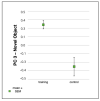Optimising Puppy Socialisation-Short- and Long-Term Effects of a Training Programme during the Early Socialisation Period
- PMID: 36428295
- PMCID: PMC9687081
- DOI: 10.3390/ani12223067
Optimising Puppy Socialisation-Short- and Long-Term Effects of a Training Programme during the Early Socialisation Period
Abstract
The socialisation period in dog puppies is one of the most important periods determining behavioural development in dogs. Here, we aimed to test the effect of providing stimulation (beyond mere exposure) early during the socialisation period (approx. 3-6 weeks) on puppies' behaviour. Each of 12 litters (83 puppies) of various breeds was divided into a treatment and a control group. Between 3-6 weeks, the treatment group received age-appropriate "challenge" exercises (carefully graded noise exposure, novel objects, and problem-solving tasks) four times per week (total 12 times). The control group spent the same time with the trainer, who cuddled or played with the puppies. In a behaviour test at 6-7 weeks, two of four principal components, "social-startle" and "response to novelty", differed significantly between the groups. Treatment puppies were bolder towards the novel object, showed a reduced startle reaction, and recovered more quickly after a loud noise. Furthermore, they accomplished the problem-solving task faster and were more persistent during problem-solving than the control group. The control group showed a higher interest in a friendly stranger. It is a possibility that increased handling experienced by the control group had beneficial effects on their sociability. No long-term effects of the treatment were found, as determined by a validated dog personality questionnaire, available for 67 dogs at the age of six months. Likely, a continuation of the treatment over a longer time period would be necessary to obtain lasting effects, since the training took place only during the first third of the socialisation period.
Keywords: Canis familiaris; dog; novel object test; problem-solving task; puppy; socialisation; startle recovery; stress inoculation; stress resilience; stress-coping.
Conflict of interest statement
The authors declare no conflict of interest.
Figures



Similar articles
-
Puppy Socialisation Experiences in Relation to Age and COVID-19 Lockdown Restrictions in the UK and ROI.Animals (Basel). 2024 May 15;14(10):1471. doi: 10.3390/ani14101471. Animals (Basel). 2024. PMID: 38791688 Free PMC article.
-
Choice of conflict resolution strategy is linked to sociability in dog puppies.Appl Anim Behav Sci. 2013 Dec;149(1-4):36-44. doi: 10.1016/j.applanim.2013.09.006. Appl Anim Behav Sci. 2013. PMID: 24910487 Free PMC article.
-
Impacts of Puppy Early Life Experiences, Puppy-Purchasing Practices, and Owner Characteristics on Owner-Reported Problem Behaviours in a UK Pandemic Puppies Cohort at 21 Months of Age.Animals (Basel). 2024 Jan 22;14(2):336. doi: 10.3390/ani14020336. Animals (Basel). 2024. PMID: 38275796 Free PMC article.
-
Canine Socialisation: A Narrative Systematic Review.Animals (Basel). 2022 Oct 22;12(21):2895. doi: 10.3390/ani12212895. Animals (Basel). 2022. PMID: 36359020 Free PMC article. Review.
-
Puppy parties and beyond: the role of early age socialization practices on adult dog behavior.Vet Med (Auckl). 2015 Apr 29;6:143-153. doi: 10.2147/VMRR.S62081. eCollection 2015. Vet Med (Auckl). 2015. PMID: 30101101 Free PMC article. Review.
Cited by
-
Methods of behavioral testing in dogs: a scoping review and analysis of test stimuli.Front Vet Sci. 2024 Oct 16;11:1455574. doi: 10.3389/fvets.2024.1455574. eCollection 2024. Front Vet Sci. 2024. PMID: 39479206 Free PMC article.
-
Puppy Socialisation Experiences in Relation to Age and COVID-19 Lockdown Restrictions in the UK and ROI.Animals (Basel). 2024 May 15;14(10):1471. doi: 10.3390/ani14101471. Animals (Basel). 2024. PMID: 38791688 Free PMC article.
-
The Puppies' Age at Adoption Time Influences the Behavioral Responses of Adult Dog.Vet Sci. 2025 Feb 14;12(2):176. doi: 10.3390/vetsci12020176. Vet Sci. 2025. PMID: 40005936 Free PMC article.
-
Evidence for the communicative function of human-directed gazing in 6- to 7-week-old dog puppies.Anim Cogn. 2024 Sep 23;27(1):61. doi: 10.1007/s10071-024-01898-y. Anim Cogn. 2024. PMID: 39311933 Free PMC article.
-
Therapy and Prevention of Noise Fears in Dogs-A Review of the Current Evidence for Practitioners.Animals (Basel). 2023 Nov 27;13(23):3664. doi: 10.3390/ani13233664. Animals (Basel). 2023. PMID: 38067015 Free PMC article. Review.
References
-
- Csatádi K., Kustos K., Eiben C., Bilkó Á., Altbäcker V. Even Minimal Human Contact Linked to Nursing Reduces Fear Responses toward Humans in Rabbits. Appl. Anim. Behav. Sci. 2005;95:123–128. doi: 10.1016/j.applanim.2005.05.002. - DOI
LinkOut - more resources
Full Text Sources

